
6 Questions for 7 Women in Tech
You know those women who’ve impacted your career and life in a memorable way — the ones who epitomize emotional intelligence and empower you to take risks?
Chances are, you still pass on their sound advice when meeting with colleagues or aspire to emulate their leadership abilities.
So in honor of International Women’s Day, we’re bringing you examples of inspiring women from our team — Anja Popp, Kelly Benish, Kimia Meshkinyar, Julia Goelles, Uliana Sirotina, Liz Sinclar, and Krystal Taing.
I had the pleasure of talking to these women, asking 6 questions ranging from whether they had to work harder than their male counterparts to what advice they would give to younger women entering the workforce.
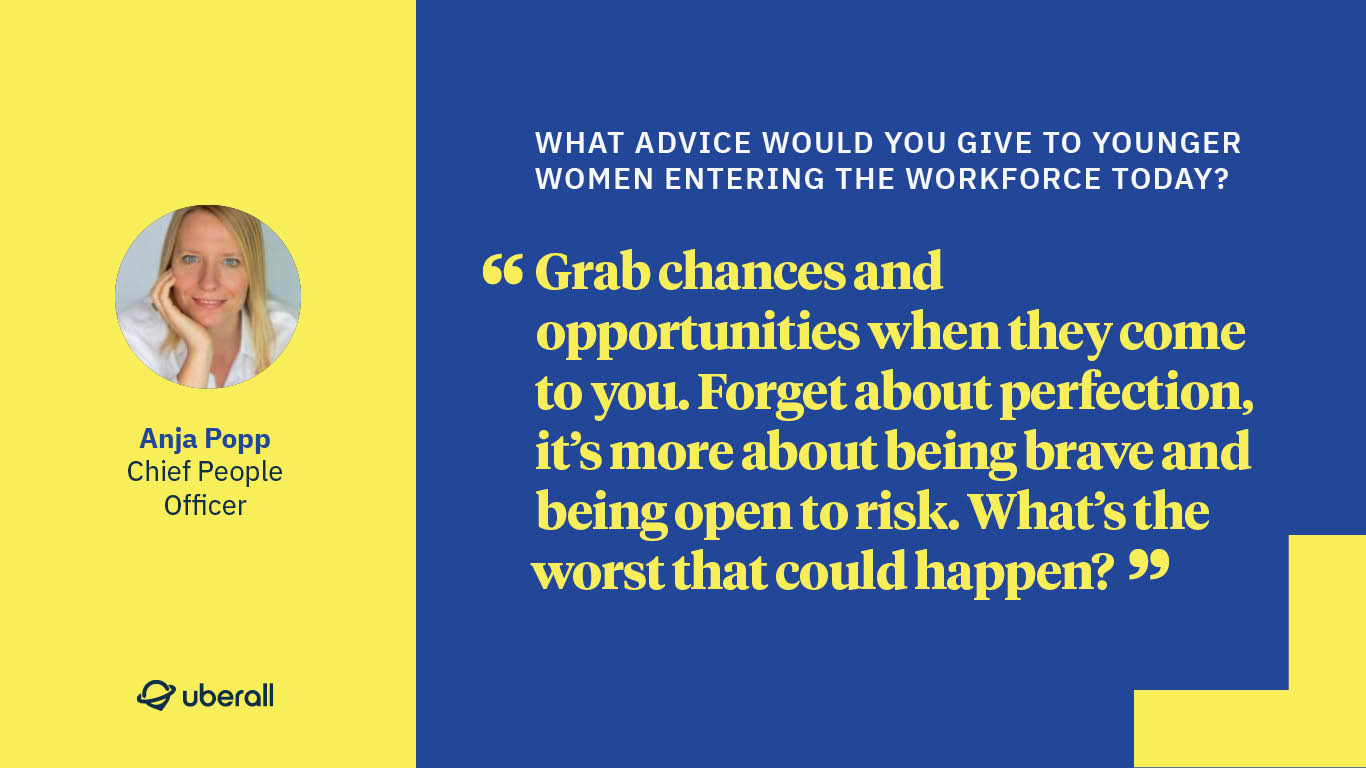
Anja Popp
Chief People Officer
What was your dream job as a child?
I didn’t have a dream job — I had dreams, but they never had to do with the job. I wanted to be Madonna or become a singer — but then I was too shy. At one point, I realized that I wanted to do something with people. First with kids, but I was so sensitive — so if something were to happen . . . But I knew I wanted to do something with people — and here I am now.
Do you feel you’ve had to work harder than male colleagues to advance your career?
The short answer is no.
But there's a longer answer.
I don't think I had to work harder — and this has nothing to do with gender — but as an introvert, I had to overcome this.
This means, that the vast majority of my career has been completely out of my comfort zone. So I always wondered, if I wasn’t introverted, would everything be so much easier? Since I’ve always had to overcome this hurdle of being shy and introverted, I had to put in the extra effort.
What is the best professional advice you've ever received?
One was from my previous boss at King. When things felt too serious or if we were anxious, she would say, “Hey, guys, come on. It's not like we are saving lives here.”
This has put things into perspective for me. Especially if you're in a role where you are not saving lives like you're a doctor, and so on. Sometimes it’s just about putting things into perspective.
And the other one was from my time working at Fujitsu. Some senior keynote speakers were on stage and someone from the audience asked one speaker, “What is your career plan?” Her response: I've never had a plan. I just grabbed chances. And I found it super cool. Maybe because it resonates with me so well — because it’s ok to not have a plan and you’re not doing anything wrong if you don’t have one.
What is your best leadership advice?
People are very diverse. So give them an inclusive environment where they can thrive. For example, not everyone has a mapped-out career play and that is ok. While there are those that do. Both are right. Let people be comfortable being who they are.
What motivates you every day?
My job. I love what I do and it plays a big role in my life. It may sound like an exaggeration, but there are a lot of days that feel so light and inspiring that it almost doesn't feel like work — but this is also because the people I'm working with on my team are just so fun to work with. It feels like I’m spending the day with friends who accomplish a lot of work. That's a good thing.
What advice would you give to younger women just entering the workforce today?
Forget about being perfect. Grab chances and opportunities when they come to you. It’s more about being brave and being open to risk. What’s the worst that could happen?
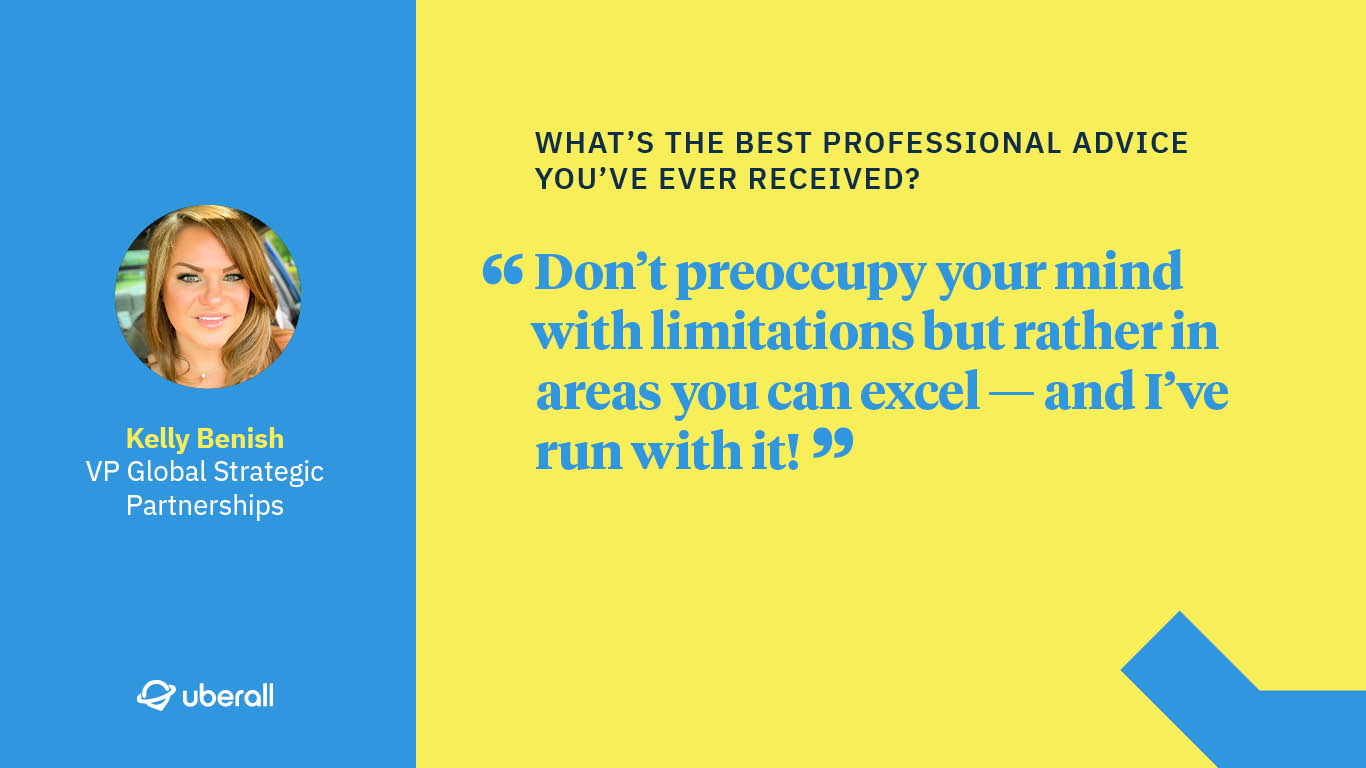
Kelly Benish
VP Global Strategic Partnerships
What was your dream job as a child?
A veterinarian or a marine biologist, until I was a little older and realized that the animals and ecosystems I would work with have the propensity to die.
Do you feel you’ve had to work harder than male colleagues to advance your career?
I don't think I'd say I had to work harder per se, but rather I've had to be more hypervigilant and hyper-aware in thinking through how I will sound and what the reaction will be from my actions.
I am not saying all people or situations are like this but I typically mentally prepare myself and strategize where labels don't apply. Whereas it's easier for men to be perceived as assertive and women to hold the perception of bossy.
I will also say that I've always been fortunate, typically working beside male CEO's. I used to try to emulate what they were doing and that wasn't the right way, I usually let people underestimate me and then let my actions or strategy speak for itself, I've made some great friends this way. I found some great mentors that helped to pull me up and teach me how to disprove stereotypes.
What is your most important leadership skill?
Empathy
What's the best professional advice you've ever received?
I consider Lex ten Veen (former CEO of Navads - acquired by Uberall in September 2018) one of my greatest mentors in life because he has pushed me to be better, do better, lead by example, and didn't allow me to entertain these gaps or challenges. He taught me not to preoccupy my mind with limitations but rather in areas I can excel, and I've run with it!
What motivates you every day?
My team
What advice would you give to younger women just entering the workforce today?
Look for good leadership and follow it, people who will take you under their wings of trust and share completely with you - the good, the bad and the ugly.
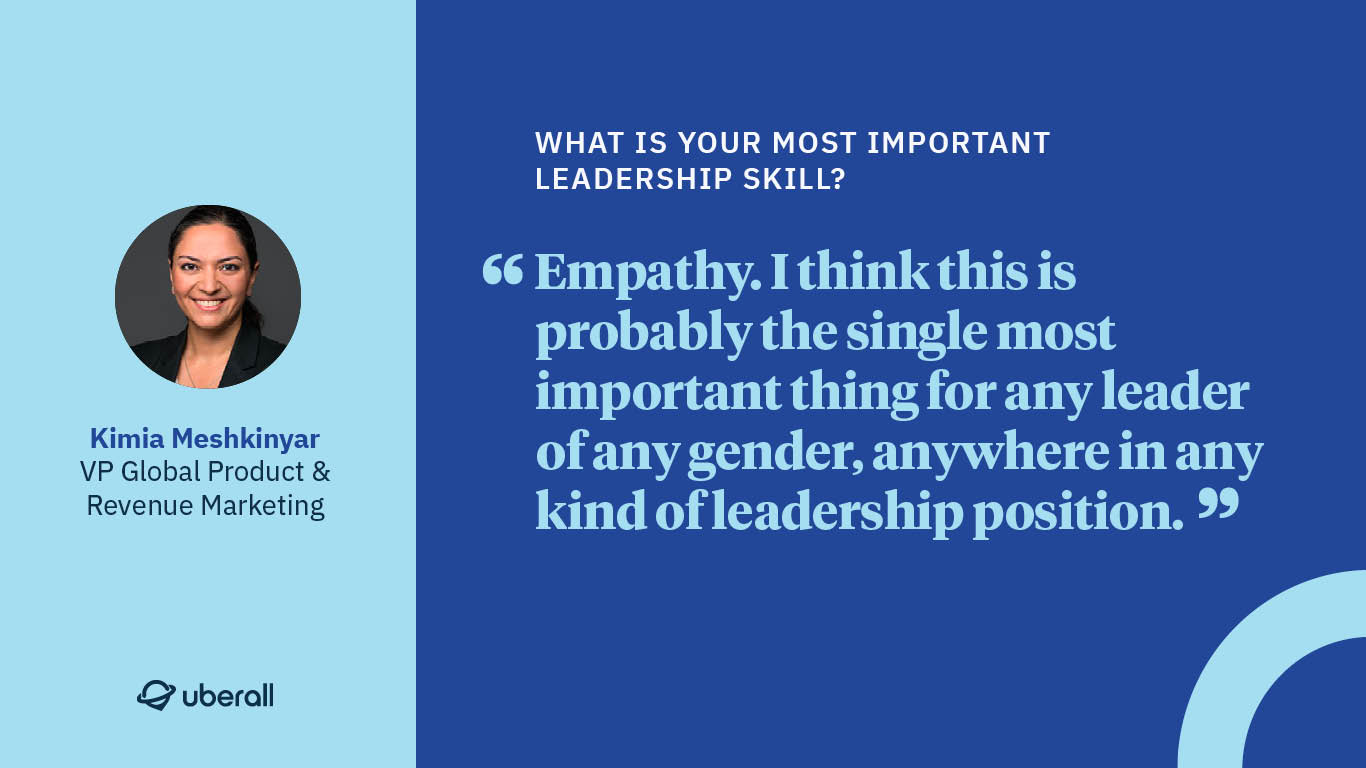
Kimia Meshkinyar
VP Global Product and Revenue Marketing
What was your dream job as a child?
I actually had a few dream jobs and started dreaming about my job when I was five. But my favorite one was to become an astronaut — I wanted to be an astronaut so bad! I had all kinds of books about space, I knew all the names of all the galaxies and all these things..
Do you feel you’ve had to work harder than male colleagues to advance your career?
It's actually hard to answer this question because I never really compared myself to male colleagues. I generally don't even see male versus female. That's not my philosophy at work or in life in general. I just see humans are human, and others are humans, too. So I never compare myself to my male colleagues. I am aware that there are some differences and I hear about glass ceilings at other companies. Personally, I haven't felt that so strongly. But I think it's probably more of a personality topic —not a male-female topic.
What is your most important leadership skill?
Empathy. I think this is probably the single most important thing for any leader of any gender, anywhere in any kind of leadership position. It’s not just at work either — but rather the ability to really feel with other people and put yourself in their shoes. That is, do not perceive others, especially your colleagues as just people who are doing XYZ.
These are human beings who may be dealing with other things at the same time.I think it's that kind of a holistic view of a person rather than just the task at hand that makes a person a good leader, to be able to connect with the team member and get something done.
I think we all put faces up right at work and in life — we are always trying to be someone. But I think the most important thing to remember is that at the end of it, we're all human.
What's the best professional advice you've ever received?
One of the best pieces of advice I've ever had is to realize that what you think or what I think in a given situation, no matter how smart, logical, or data-driven it may be, is that it’s only one perspective.
And as humans, we all are limited by our own individual perspectives of something. Even if it is data-driven, we can never see the truth of something — the absolute truth of something from all angles at the same time, that is just a human limitation.
So to be open to others’ opinions and to be open to hearing different views of oneself. And really accept the fact that maybe thinking about something that someone else says that is just completely wildly different from what one believes, can be complementary to one's belief. And we can then together see the whole truth. So kind of, we really need other people to tell you the truth in the business world, other team members, and especially diversity, and I don't mean diversity in the sense of male or female or anything like that. I mean, diversity of views and ways of thinking that can help the business Excel, you know. So it's this kind of openness, that also relates to empathy a little bit, but at the ideological level here.
What motivates you every day?
It's the people I work with — the most beautiful culture in any company I've ever worked at. When I see my colleagues in the morning that just makes me smile, no matter what topic it is.
What advice would you give to younger women just entering the workforce today?
Don’t think of yourself as a woman or a man. Just be yourself and don't be afraid. I think the most important thing is to not be afraid for any reason, even when something is completely new. Rely on the knowledge and experience you have — and ask for help when you need it. This has personally worked very well for me. It's about not being afraid to try things, which aligns with the Uberalll value, “Be Bold and Drive Change.”
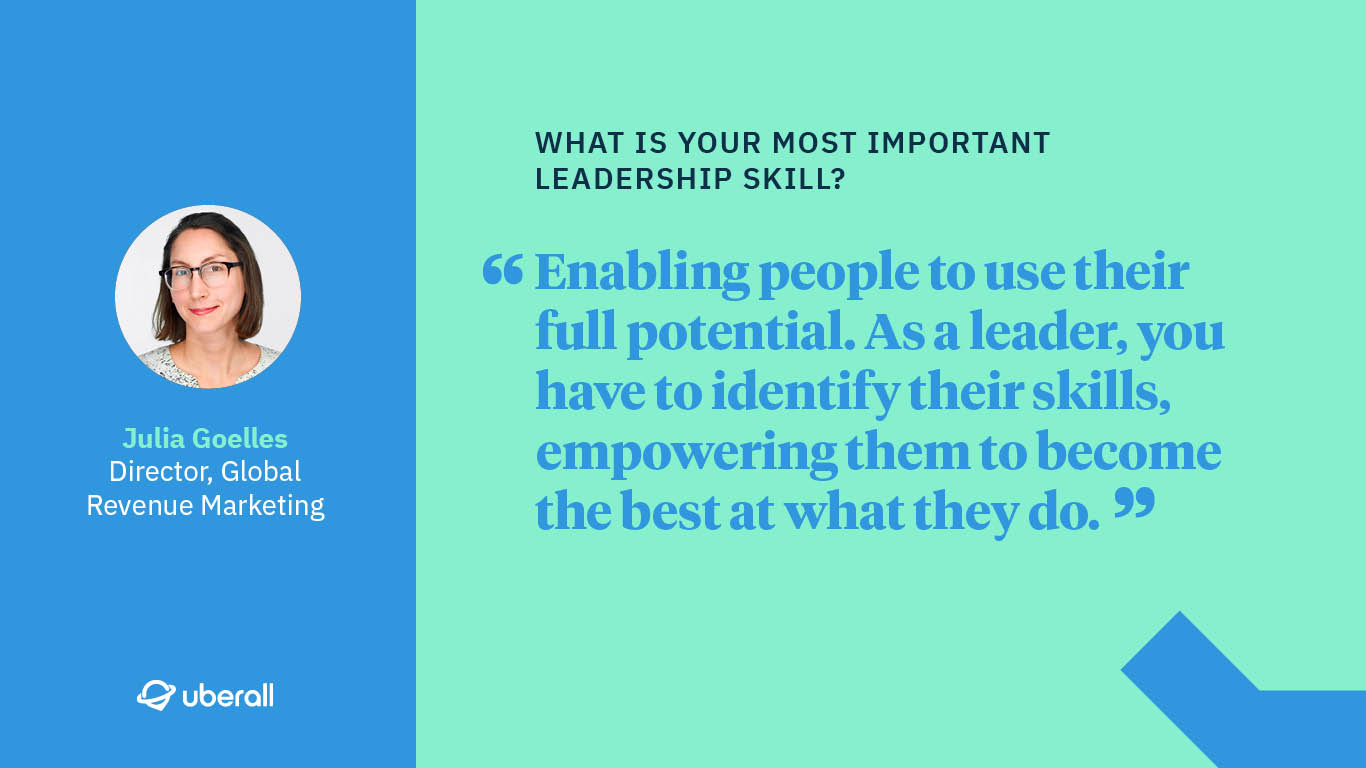
Julia Goelles
Director Global Revenue Marketing
What was your dream job as a child?
I always wanted to be an author. When I was small I even created and designed several (very short ;)) books.
Do you feel you’ve had to work harder than male colleagues to advance your career?
I have a strong work ethic and so do others – women just like men. Until now this has proven to be helpful to my career.
At the same time, men have a different way of presenting themselves: They are more confident and able to make themselves visible. And men are perceived differently: Success and good ideas are often attributed to them and generally there is also a bigger confidence that they can and should handle it.
What is your most important leadership skill?
Helping people use their full potential and make the most of their talents. Everyone is different, has a unique personality and skill set. As a leader, you have to respect and especially identify that in order to make people love their work and become the best at what they do. People don’t need you to always tell them what to do but they need guidance on their journey.
What's the best professional advice you've ever received?
Don’t just do your job and focus on your projects and tasks at hand – think beyond that, think big! You need to actively keep up with what’s going on in the industry, stay up to date with wider trends, and take time to educate yourself on what goes in your field.
This is advice I got from my (female) boss at my previous SaaS company and it has helped me ever since.
What motivates you every day?
I draw energy from interacting with people – generally and especially at Uberall. Another motivating aspect of my work is to use my marketer’s high-level perspective on things. I try to connect the dots and bring the right people together increasing the impact of our actions.
I need to feel this energy around me. What I enjoy is a dynamic atmosphere and the prospect of new projects and challenges. Last but not least I really thrive in an international and diverse environment with people of different backgrounds and with unique perspectives.
What advice would you give to younger women just entering the workforce today?
Cliché alert! Magic happens outside of the comfort zone. As blah blah as this may sound, I’ve come to learn that in essence, it’s true. I started my career in a communication agency, then worked in event and project management in culture and politics, all very traditional, hierarchical areas. I soon became frustrated at being stuck in operational tasks and not really seeing the big opportunities for me. This was when I decided to take a step into the unknown and make a move into a completely new industry – which is how I ended up in the tech sector. And it has been an incredibly exciting journey!
And one last tip, which is closely related to the comfort zone advice: Put yourself out there. Only you can make yourself and your work visible.
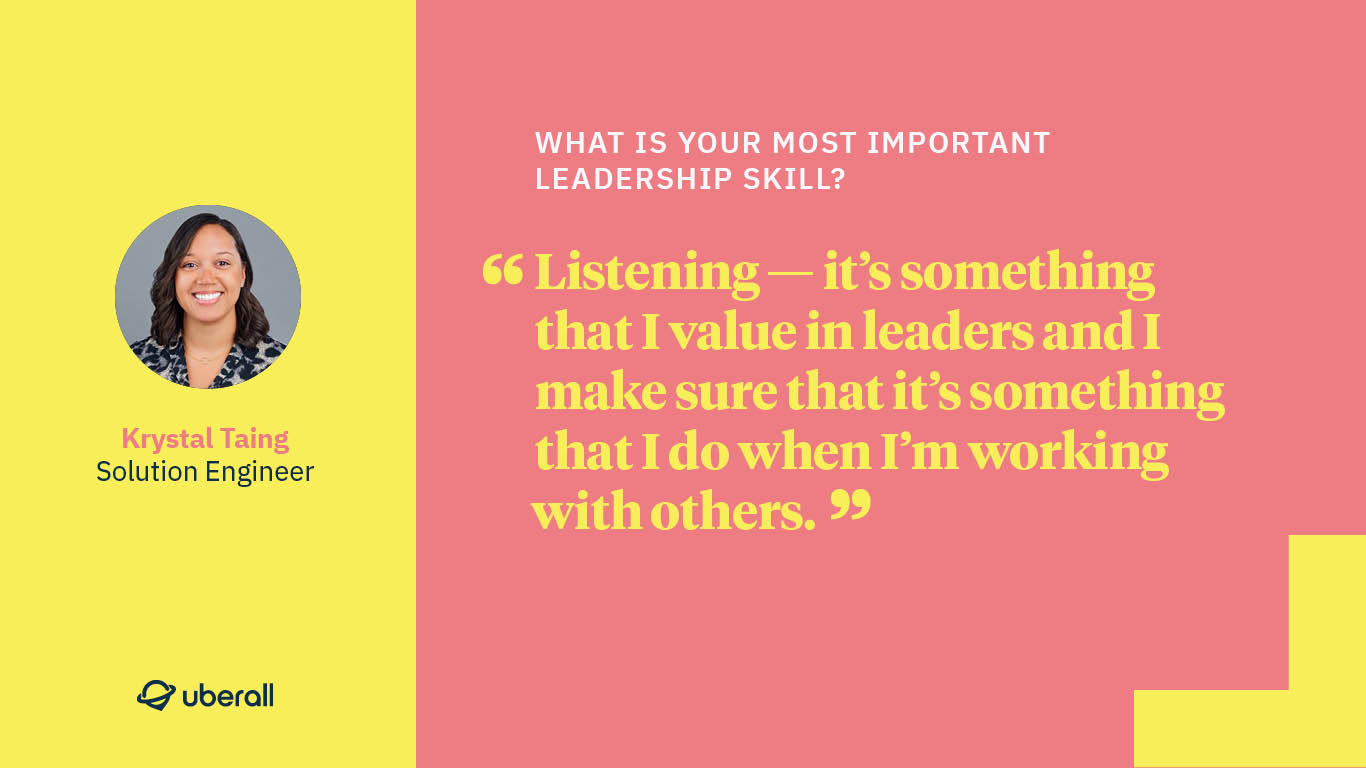
Krystal Taing
Solution Engineer
What was your dream job as a child?
A second-grade teacher. It was my favorite grade and I think helped develop my passion for learning. I think teachers are miracle workers.
Do you feel you’ve had to work harder than male colleagues to advance your career?
I don't know that I've had to work harder. I think I've maybe worked similarly as they have with less recognition or less opportunity. But I don't know that I've necessarily had to work harder — but I may not have been afforded as many opportunities as my male counterparts.
What is your most important leadership skill?
Listening — it's something that I value in leaders and I make sure that it's something that I do when I'm working with others.It’s one of those hidden skills that just really make a difference.
What is the best professional advice you've ever received?
It came from someone I reported to a few years ago — when sharing some struggles and challenges with her. She said to me, “I want you to know that what you experienced was not normal. You have this talent but it was the environment you operated in that caused it to be unsuccessful.” At that point, I was self-reflective because I had just completely changed the direction I was going in, based on feedback I had received in the past. Her words helped me instill faith in myself. Ultimately, if you are motivated and passionate about your work and performance, I think you can be too hard on yourself sometimes. It’s okay to give yourself a break.
What motivates you every day?
Having the space to be creative. At Uberall, I have a space to try and succeed and to try and fail. And I think finding a place and people around you that you can lean on is really important. In our work, we're fortunate to not have been as impacted by the pandemic. we're still able to see successes in our work every day — and that’s what matters. I can see the fruits of my work every day.
What advice would you give to younger women just entering the workforce today?
Your feelings are valid. I think about this a lot because I have a six-year-old daughter. One of the things that have been really important to me and raising her is telling her to feel what she feels. So, you feel frustrated, you're allowed to be frustrated if you feel sad or scared or whatever, those feelings that you have are valid and you're allowed to feel them.
I think that's going to be different. It's going to be a different environment for the generations after us, entering the workforce, especially if you're thinking about tech or science. I think there's going to be a difference in how we treat feelings in the workplace, allowing our next generation to be more creative and more successful.
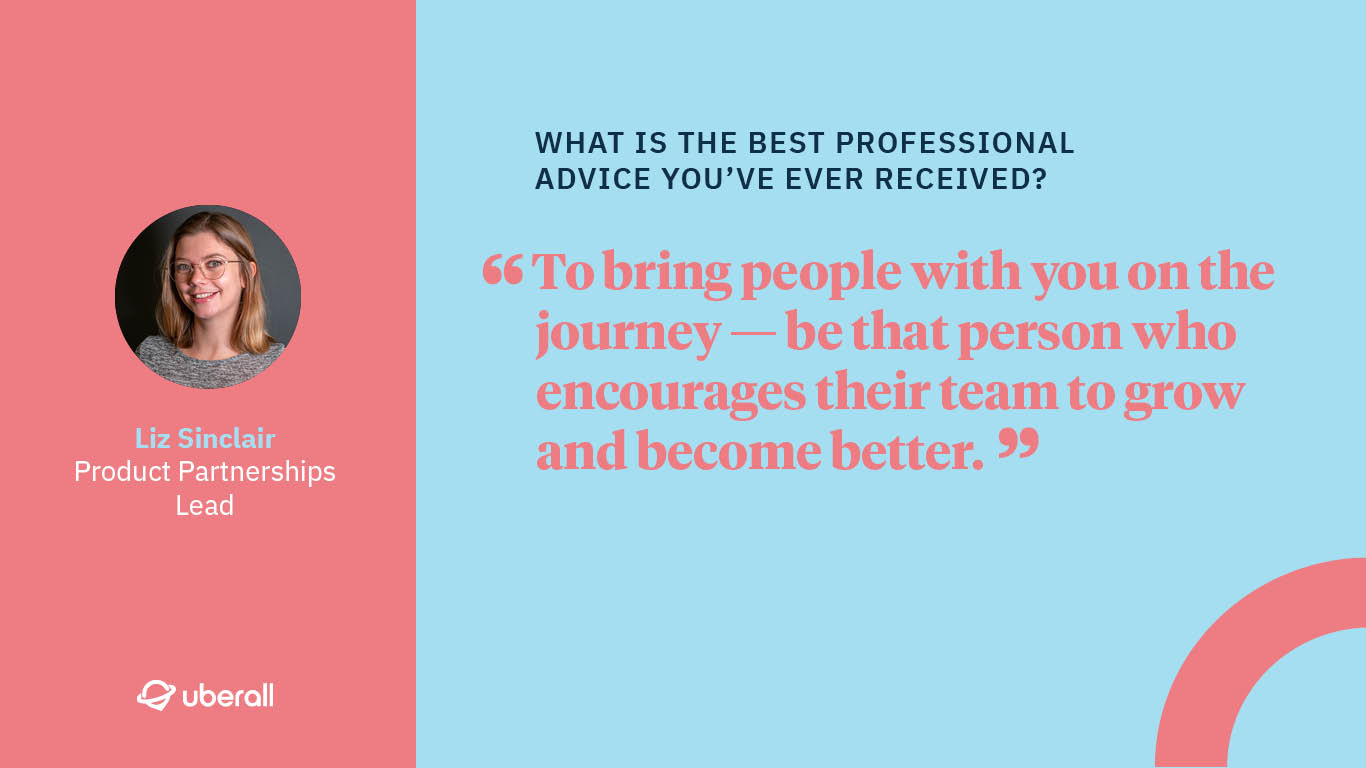
Liz Sinclair
Product Partnerships Lead
What was your dream job as a child?
I flitted between many things, which speaks a lot about my personality still I would say. Everything from a Vet, a Lawyer, a Nurse to putting on events, but for the last 10 years or so I would say it’s been a bit of a pipedream to open up my own sandwich shop.
Do you feel you’ve had to work harder than male colleagues to advance your career?
Everyone has their frame of reference and so what may appear one way to me could appear another to someone else but both observations would be correct. From my reference frame, I feel I have been nothing but supported and encouraged throughout my life and career so far.
Upon moving to Germany I met and worked for Simon Woods (now CRO at Sonovate) who to this day is one of the most inspiring leaders I know. Now at Uberall I work for Victor Landau with an almost opposite leadership style which took some adjusting but I have never doubted his faith in me and the opportunities he gives me to grow within the company.
Within the product team here at Uberall we are 3. Women and 2 Men in team lead positions and an equal divide between men and women within the wider team, it’s nice to be surrounded by so many different perspectives, backgrounds to the point where you don’t notice anymore the gender divide.
What is your most important leadership skill?
I had to ask a couple of people for feedback on this topic, and both said passion and commitment. Which is nice to hear — and I think that translates to being a good motivator.
What's the best professional advice you've ever received?
To bring people with you on the journey, Simon Woods (now CRO at Sonovate) told me the sign of a good leader is someone who encourages their team to grow and become better than that rather than hold them back due to your own insecurities. Excellent people reflect well on you so it's a win-win.
What motivates you anew every day?
The fear of being fired - haha, I’m kidding. It can be hard to stay motivated when you’ve been working in isolation for over a year with no end in sight but the thing that gets me up in the morning is the small hope this will all be over one day and knowing that we’re building a really cool product, which helps people every day. I can’t wait to fill up my team vacancies and start working on the next generation of tech partnerships.
What advice would you give to younger women just entering the workforce today?
The same advice I would give to anyone — don’t let other people take credit for your work, stop using the term “we” and start using the term “I.” This is one of those things I know and yet still do myself. Stop apologizing, I don’t know if this is a British thing or a woman thing but it’s annoying to listen to and most of the time unnecessary.
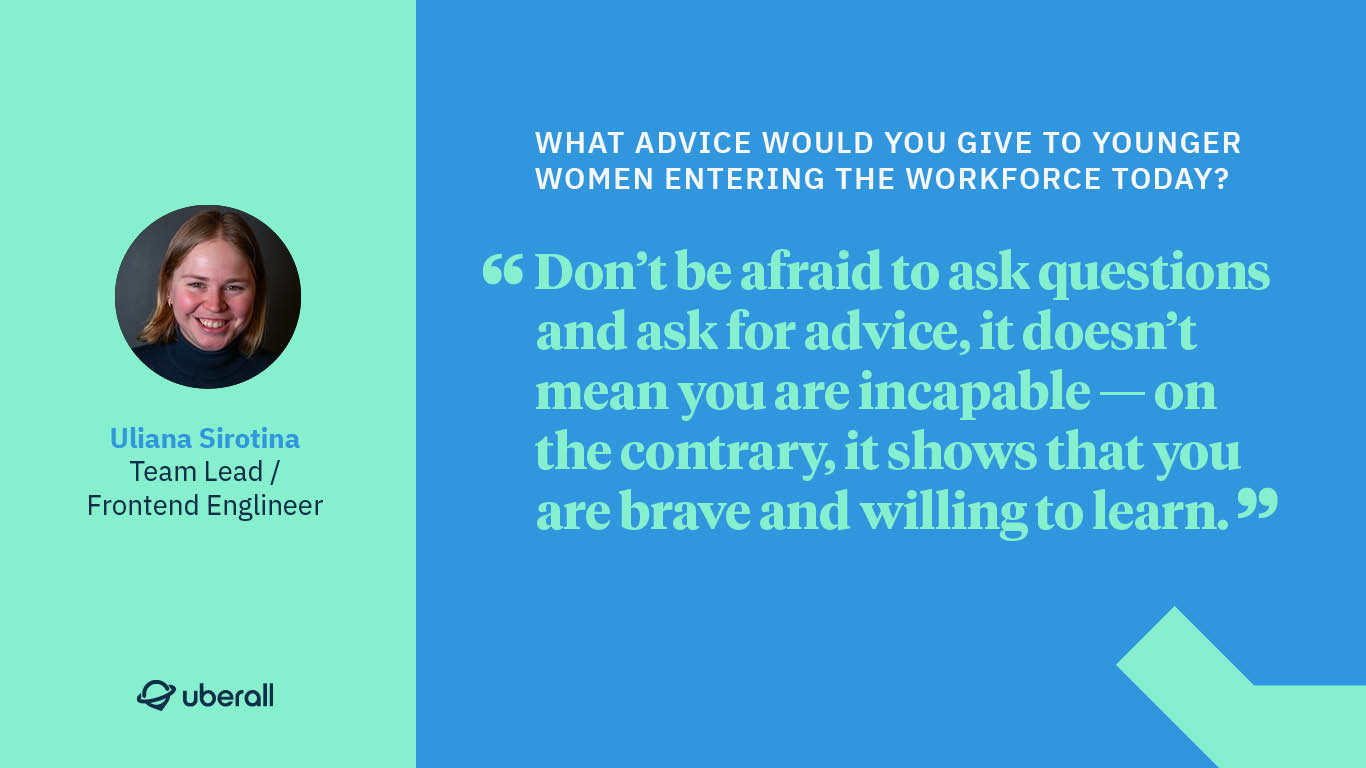
Uliana Sirotina
Team Lead / Frontend Engineer
What was your dream job as a child?
I don't think I had one. I remember thinking about being a developer, and I remember deciding to go into it. But I didn't have a dream job as a child.
What motivates you every day?
It can be different things — such as seeing snow outside today — or because there is something exciting happening during the day and I know that I'm going to be a part of it.
What is your most important leadership skill?
Listening with intention. For example, when I'm in a meeting, I notice quite often I am listening and that I can hear both sides of what people are saying. This helps me to bring people to an understanding and I can help them kind of find that sweet spot.
Do you feel you’ve had to work harder than male colleagues to advance your career?
I hope it won't sound disappointing, but I actually don't. Sometimes I actually think the opposite.. Like in university, there were situations where I felt like I was cut some slack. But in my everyday tasks at work, I don't notice it. I wonder sometimes when other people say to me “Oh, you are a woman in tech!” I often think, is it special, I don’t see it? |
What's the best professional advice you've ever received?
It wasn’t so much advice, but my manager in my first job in Russia encouraged me to take a chance and move to Germany. At the time, I was working and it would mean leaving the job to go study in another country — which felt like it could be a step back because the company wanted to promote me. Instead, he said I should go and do it.
What advice would you give to younger women just entering the workforce today?
Don’t be afraid to ask questions and ask for advice, it doesn’t mean you are incapable — on the contrary, it shows that you are brave and willing to learn.
Want to be part of the Uberall family? Explore our open positions

